Medically reviewed by Dr. Ramesh Gaddam, M.D. — Written by Sumalatha, D.N.H.E
Electrocardiography (ECG or EKG) is a medical test that records the electrical activity of the heart over a period of time. This non-invasive procedure is commonly used to detect and diagnose heart abnormalities by measuring the electrical impulses generated by the heart’s muscle cells.
Home ECG/EKG Devices:
Technology has improved a lot, making it possible to create small and easy-to-use ECG/EKG devices for home use.
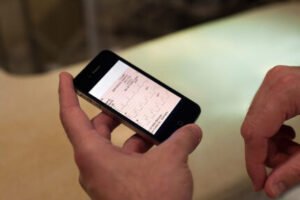
These gadgets are designed to be convenient and user-friendly.
They usually come in two types: handheld monitors or wearable gadgets.
The handheld ones are small machines you can hold in your hand, while the wearable ones are like wristbands or patches that you can wear on your chest or wrist.
They’re simple to use and can be worn comfortably throughout the day.
Benefits of Home ECG/EKG Devices:
Using home ECG devices offers various benefits:
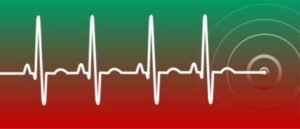
Convenience:
Home ECG/EKG devices are like small machines you can use at home to check how your heart is doing.
They’re handy because you don’t need to keep going to the doctor all the time.
Early Detection:
Using these devices regularly can help find any problems with your heart early.
That way, doctors can help you quicker and you can take steps to stay healthy.
Peace of Mind:
If you already have heart issues or are worried about your heart, these devices can give you peace of mind.
You can keep an eye on your heart whenever you want and catch any changes early.
Data Sharing:
Some of these devices can even save your heart data and send it to your doctor.
This makes it easier for your doctor to keep track of how your heart is doing, even if you’re not at the clinic.
Empowerment:
Steps to Check ECG at Home
Following are the steps to check and record ECG(EKG) at Home.

1. Obtain an ECG device
There are various types of ECG devices available for home use.
Some are portable handheld devices, while others are smartphone apps with ECG capabilities.
You can purchase these devices online or from medical supply stores.
Make sure to choose a device that is reliable and approved for home use.
2. Prepare yourself
Before starting, wash your hands thoroughly to ensure cleanliness.
Remove any jewelry or clothing that might interfere with the placement of the electrodes.
3. Understand the electrodes
Most ECG devices come with adhesive electrodes that you need to place on specific areas of your body.
Typically, you’ll need to place electrodes on your wrists and ankles, as well as on specific spots on your chest.
The device’s instructions will guide you on the proper electrode placement.
4. Connect the electrodes
Attach the electrodes to the designated areas on your body according to the device’s instructions.
Make sure they are securely attached and have good skin contact.
5. Turn on the device
Power on the ECG device according to the manufacturer’s instructions.
If you’re using a smartphone app, launch the app and follow the on-screen prompts.
6. Record the ECG
Once the device is ready, initiate the ECG recording.
Follow the instructions provided by the device to ensure a successful recording.
Typically, you’ll need to remain still and relaxed during the recording process, as movement and stress can affect the accuracy of the results.
7. Review the results
After recording the ECG, the device will typically display the results on its screen or within the app.
Take the time to review the results carefully. Look for any irregularities or abnormalities in the ECG waveform.
8. Save or share the results
Some devices allow you to save the ECG results for future reference or share them with your healthcare provider for further analysis.
Follow the device’s instructions for saving or sharing the results.
9. Consult with a healthcare professional
If you notice any concerning findings or symptoms during the ECG recording, it’s important to consult with a healthcare professional.
They can help interpret the results and provide guidance on any necessary follow-up steps.
10. Regular monitoring
Depending on your health status and any underlying conditions, your healthcare provider may recommend regular ECG monitoring at home.
Follow their guidance on the frequency and duration of home ECG recordings.
Uses of EKG or ECG
An Electrocardiogram (EKG or ECG) is a test that checks how your heart is working. It measures the electrical activity of your heart over time.
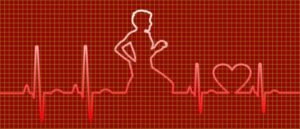
During the test, small sticky patches called electrodes are placed on your skin, usually on your chest, arms, and legs. These electrodes pick up the electrical signals made by your heart as it beats.
The signals are then turned into a picture called an electrocardiogram, which shows the rhythm and electrical patterns of your heart.
EKG monitoring is important in healthcare because it helps doctors understand how your heart is working.
Diagnosing heart problems:
EKG monitoring helps doctors diagnose different heart issues like irregular heartbeats, heart attacks, and heart rhythm problems.
By looking at the patterns in the EKG, doctors can find out what’s causing the problem and decide how to treat it.
Checking heart rhythm:
One of the main reasons for doing an EKG is to see if your heart is beating normally.
A normal heartbeat follows a specific pattern, but if it’s different, it could mean there’s a problem like atrial fibrillation or ventricular tachycardia.
By keeping an eye on your EKG over time, doctors can spot these issues.
Assessing Heart
An EKG can also show how well your heart is working overall.
Changes in the EKG pattern, like ST-segment elevation or depression, can show if your heart isn’t getting enough blood (myocardial ischemia) or if you’ve had a heart attack.
By keeping track of these changes, doctors can understand how serious the problem is and decide on the best treatment.
Monitoring risks:
EKG monitoring helps doctors figure out how much risk you have of having more heart problems in the future.
By looking at your EKG results along with other information, they can tell if you’re likely to have more heart trouble.
For people who are at high risk, like those who’ve had heart issues before, keeping a close watch with EKG monitoring can help prevent problems and make things better.
Summary:
In short, EKG monitoring is really important for understanding, diagnosing, and managing heart problems.
It gives doctors useful information about how your heart is working, helps them find issues, and allows them to make decisions that can improve your health.
Accuracy
When we talk about how accurate home EKG (ECG) monitors are, there are a few things to consider:
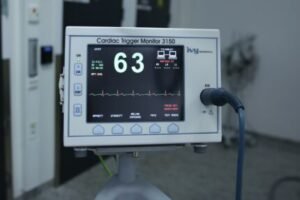
FDA Approval and Testing:
Many home EKG monitors are FDA-approved, meaning they meet safety and accuracy standards.
However, it’s crucial to pick a device that’s been thoroughly tested and approved by the FDA.
Comparison to Hospital Equipment:
Home EKG monitors might not be as precise as the machines in hospitals, but they still offer useful insights into heart health.
They’re designed for personal use and shouldn’t replace professional medical checks.
User Influence:
The accuracy of home EKG monitors can vary based on things like how you use them, where you put the electrodes, and how well the device is set up.
Following the instructions carefully can make them more reliable.
Spotting Common Issues:
Home EKG monitors are good at catching usual heart rhythm problems like AFib, bradycardia, and tachycardia.
But they might not catch every kind of heart issue.
Mistakes Happen:
Just like any test, home EKG monitors can make mistakes.
They might say there’s a problem when there isn’t (false positive) or miss a real issue (false negative).
If you’re worried about the results, it’s smart to talk to a doctor.
New Tech Helps:
Newer home EKG monitors have better technology, like improved signal processing and electrodes, which can make them more accurate.
Working with Doctors:
It’s important to share your home EKG readings with your doctor for proper understanding and advice.
They can help interpret the results and suggest the right steps.
In short, home EKG monitors are useful for tracking heart health, but they’re not perfect.
It’s best to use them alongside other health checks and always consult a doctor if you’re concerned about the results.
When choosing an EKG/ECG monitor for home use, here’s what to think about:
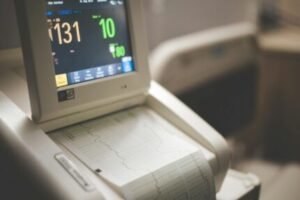
Accuracy:
Pick a monitor that’s good at detecting and recording heart signals.
Check for FDA approval to ensure it meets quality standards.
Ease of Use:
Choose one that’s easy to use, especially if you’re not familiar with medical devices.
Look for clear instructions and simple design.
Features:
Think about what features matter to you.
Consider recording duration, portability, connectivity, data storage and analysis, and alarm/notification features.
User Reviews:
Check what other users say about different monitors.
Look for feedback on accuracy, ease of use, durability, and customer support.
Price and Value:
Balance the price with what you get.
Higher prices might mean more features or better quality, but make sure it fits your needs and budget.
Compatibility:
Make sure the monitor works with your devices like smartphones or computers.
Check compatibility requirements and software.
Customer Support:
Choose a monitor from a reliable company with good customer support and warranty coverage.
They should help you with setup and any issues you have.
By thinking about these things and doing some research, you can find the best EKG/ECG monitor for keeping track of your heart health at home.
Best ECG(EKG) Monitors for Home Use

Following are the best ECG Monitors available for home use.
| Sl. No | Brand | Amazon Rating | Buy Online |
| 1 | 4.4 / 5 | Buy Now | |
| 2 | 4.5/5 | Buy Now | |
| 3 | 4.6/5 | Buy Now | |
| 4 | Top Rated EKGs | Buy Now |
Disclaimer: “As an Amazon Associate, I earn commission on qualified purchases. Thank you for your support!”
Frequently Asked Questions
What is an EKG Monitor?
An EKG monitor, also known as an electrocardiogram monitor, is a medical device used to measure and record the electrical activity of the heart.
It provides a visual representation of the heart’s rhythm and function, typically in the form of a graph or waveform.
What does an EKG Measure?
An EKG measures the electrical impulses generated by the heart’s muscle cells as they contract and relax.
These impulses are recorded through electrodes placed on the skin, which detect the electrical activity and transmit it to the EKG monitor.
The resulting waveform provides valuable information about the heart’s rate, rhythm, and any abnormalities in its function.
Are ECG and EKG the Same?
Yes, ECG (electrocardiogram) and EKG (electrocardiograph) refer to the same medical test and are used interchangeably.
Both terms describe the process of recording the electrical activity of the heart.
How do you Read an EKG Monitor?
Reading an EKG monitor involves interpreting the various components of the waveform, including the P wave, QRS complex, and T wave.
Each of these components corresponds to different phases of the cardiac cycle, and abnormalities in their appearance can indicate specific heart conditions.
Healthcare professionals analyze these patterns to diagnose arrhythmias, ischemia, myocardial infarction, and other cardiac abnormalities.
What is a Normal EKG Result?
A normal EKG result typically shows a regular rhythm and consistent intervals between the different waveform components.
The heart rate falls within a normal range, and there are no signs of abnormalities such as irregularities in the rhythm or ST segment elevation or depression.
However, it’s essential to note that interpretation of EKG results should be done by a qualified healthcare professional to ensure accuracy and proper diagnosis.
What does an Abnormal EKG Mean?
An abnormal EKG can indicate various heart conditions or abnormalities in the heart’s electrical activity.
These abnormalities may include irregular heart rhythms (arrhythmias), signs of myocardial infarction (heart attack), ischemia (lack of blood flow to the heart muscle), electrolyte imbalances, structural abnormalities in the heart, or other cardiac disorders.
It’s essential to consult with a healthcare professional for proper interpretation and diagnosis if an EKG shows abnormalities.
Is an EKG Accurate?
Yes, an EKG is generally accurate in detecting abnormalities in the heart’s electrical activity.
However, it’s important to note that an EKG is just one tool used in diagnosing heart conditions, and its interpretation should be done by a qualified healthcare professional.
Sometimes, additional tests or examinations may be needed to confirm a diagnosis or further evaluate any abnormalities detected on an EKG.
Can ECG Detect Heart Blockage?
Yes, an ECG (electrocardiogram) can sometimes detect signs suggestive of heart blockage, particularly if it results in changes in the ECG waveform indicative of myocardial ischemia or injury.
However, an ECG alone may not definitively diagnose heart blockage.
Additional tests such as stress testing, echocardiography, cardiac catheterization, or coronary angiography may be needed for a more accurate assessment of coronary artery disease and heart blockage.
Is My Heart OK if ECG is Normal?
While a normal ECG (electrocardiogram) is reassuring, it does not guarantee that your heart is completely free from any issues.
An ECG provides a snapshot of the heart’s electrical activity at the time of the test and may not detect all types of heart conditions or abnormalities.
Other factors such as symptoms, medical history, risk factors, and additional tests may also need to be considered to assess overall heart health.
If you have concerns about your heart health, it’s essential to discuss them with your healthcare provider for a thorough evaluation.
Medically reviewed by Dr. Ramesh Gaddam, M.D.

General Physician, Diabetologist, and Critical Care Specialist.
Discover more from Health Build-Up
Subscribe to get the latest posts sent to your email.